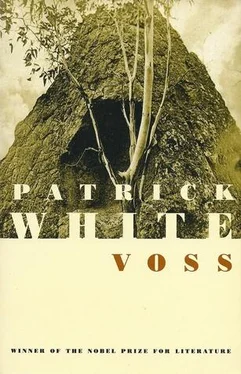‘I do not know, Alice,’ said Miss Hester, who was dependent on her sister for opinions and initiative. ‘Which poets do you suppose they read?’
‘I must ask,’ said Miss Linsley.
But she did not.
Dedicated to culture, this immortelle recoiled from poetry, almost as if it had been contrived as part of an elaborate practical joke, and might shoot out without warning, to smack her in the middle of her withered soul. She was happier with established prose, but since the arts had to be practised, if only to increase the mystery of woman in the minds of dreadful colonial males, her preference was for the study of music, discreeter than the spoken word, sketching and water-colour, if confined to flowers, fruit, or a pretty landscape, and that hardy stand-by, leatherwork, for which an elderly gentleman’s services were obtained.
Such were her standards and ideals, in spite of which her girls, or young ladies of the best landed class, had begun to breathe poetry. They were even writing it, under the vines, on fragrant scraps of paper, and inside the covers of books.
Once when Miss Linsley had called Miss Trevelyan into her study, as was her frequent habit, to ask for anything but advice, she did just happen to remark:
‘Miss Trevelyan, Maud Sinclair must be reminded not to leave her belongings in the hall. Here is her Botany, for instance, with verses written on the fly-leaf. Original verses, I take them to be.’
Miss Trevelyan read.
‘A love poem,’ was her grave judgement.
‘Do you not find it disturbing that young girls should be writing love poems on the fly-leaves of their lesson books?’
‘It is usual at that age,’ Miss Trevelyan said. ‘Particularly amongst girls who read. They are in love with what others have experienced. Until the same experience is theirs, the best they can do is write a poem. Did you never compose an indifferent love poem at Maud Sinclair’s age?’
‘I most certainly do not remember,’ Miss Linsley replied.
From yellow she was becoming pink. Her annoyance teetered on the verge of giggles, as she rode her disapproval with determination.
‘But do you not consider it a most unhealthy state of affairs?’
‘I would call it a fortunate indisposition,’ Miss Trevelyan suggested. ‘Probably poor Maud will suffer from excellent health for the rest of her life.’
Miss Trevelyan was really rather queer but, secretly, Miss Linsley was longing to admire.
So, briskly, she changed the subject.
‘I have received a letter,’ which she produced as evidence, ‘from a Mrs de Courcy, who is known to your aunt, it appears. It is an invitation to little Mary Hebden for Thursday week. As you know, I do not approve of parties during term, but as this is a particular occasion, in honour of Mary’s uncle, Colonel Hebden, who has returned from an expedition into the bush, I propose to accept.’
‘Oh,’ said Miss Trevelyan. ‘Yes.’
‘Now, it is suggested that you should accompany Mary,’ Miss Linsley continued.
‘I?’
‘Colonel Hebden has expressed a wish to make your acquaintance, as a friend of Mr Voss, the lost explorer, for whom he has been searching.’
‘I?’ repeated Miss Trevelyan. ‘But I fail to see how I can be of use or interest. It is all done with. I knew the person in question very slightly. He dined once at my uncle’s house.’
‘It is the Colonel’s wish,’ Miss Linsley said. ‘And I cannot disappoint Mrs de Courcy, who, I am told, is the widow of a judge.’
‘I,’ said Miss Trevelyan, ‘I am confused.’
As she went to her room, to revive herself for morning school with thought and cold water, several little girls who greeted her were frightened by the wind of her skirts, as well as surprised at her appearance, for her skin had turned a dark brown. But in her room, the mistress realized how little she knew herself, for she did wish to be questioned by the Colonel, though trembling already for the consequences, whatever they might prove to be.
Very quickly the day was upon them. As she waited in the hall for Miss Trevelyan and the hired carriage, Mary Hebden, in a pretty gauffered hat, thought she might be sick upon the sweating stones. She sat very formally, however, the starch of her best petticoat cutting cruelly into her knee, in every way a worthy sacrifice to Mrs de Courcy’s gathering.
Mrs de Courcy, a lady in comfortable circumstances, was herself excited, though not at the prospect of her party, for she entertained a good deal. She was moved, rather, by the presence of her cousin, Colonel Hebden, a tall, copper-coloured gentleman of a distinguished ugliness, who had done such a brave thing in going off into the bush after the lost explorer, not at all a desirable individual, she understood, and a foreigner as well.
‘You are singularly uncommunicative on the subject of your expedition,’ she now complained to the Colonel, whom she had bidden early, so that she might enjoy looking at him, and hearing things that other people would not. ‘Did you find nothing ?’
‘A button under a tree,’ said the Colonel, who could not take delightful women seriously.
Moreover, he had at one time allowed himself to be persuaded that his cousin was the most delightful of all.
‘A button? If I am such an idiot!’ protested Mrs de Courcy. ‘You are an exasperating wretch, Hugo. But I shall stop pestering, since I am not a person to be trusted with information of significance.’
‘You cannot expect a man returned from the bush to be obsessed by information of significance when faced with whipped cream,’ Colonel Hebden replied.
‘Yet, you are obsessed,’ said Mrs de Courcy, whom he had intended to please.
A woman of some intelligence, she had set to work early in life to disguise her share of intellect, out of regard for the exigencies of Society, and a liking for the company of men. Such ruthlessness was almost justified by her triumphs as a hostess, the success of her late husband’s career, to which she had devoted herself unceasingly, and the continued admiration of all gentlemen. If most ladies were guarded, if not actually cold in their relationships with Mrs de Courcy, it suited her, for ladies did not enter into her scheme, except to keep the ball rolling through the hoops of social intercourse.
‘Obsessed,’ she repeated, patting a bow of the dress which she could no longer feel suited her.
‘I have lost the habit of civilized life,’ explained the Colonel.
‘You are in love with the country!’ cried Mrs de Courcy, with deliberate raucousness, making it sound like a lesson a parrot had learnt.
Today, however, he was not pleased by a display of mere skill.
‘If you had been a man, Effie, you might have become an explorer. You are sufficiently tenacious. Your thirst for conquest would have carried you over the worst of actual thirst.’
‘Though my character may be nasty enough, as you suggest, I would have become an explorer out of sheer boredom,’ Mrs de Courcy broke in.
‘Voss appears to have been inspired.’
‘Oh, Voss, Voss, Voss! And noble You? Do not tell me that you are not inspired also!’
‘I am a tentative explorer,’ said the Colonel, quite humbly for an imposing man, ‘or less than that, even — one who follows in the tracks of another, not so much to find him alive at the end, as to satisfy curiosity.’
‘You are honest,’ cried his companion, ‘and that is why I love you.’
That you no longer love me, and I am not honest enough to admit, was what she did not add.
Instead, she said, extending her throat, until it reached the point where youth returns:
‘I have a surprise for you.’
The Colonel expressed gratitude, even though he did not hope to experience surprise.
Читать дальше












